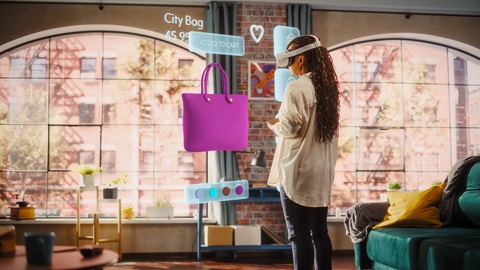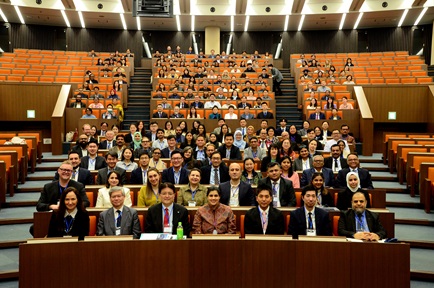How this second-gen boss is taking her old-school family business into the digital age
NBS alumna Bay Yanming, CEO of Safety Innovators, knew change was inevitable in preparing her family's ship supply business for the future
After Ms Bay Yanming took over Safety Innovators, her parents’ marine supply firm located in JTC’s Tuas Industrial Estate, in 2010, she saw first-hand how much it needed to change. For years, she faced an uphill task in hiring young people to build the company’s next generation of employees and managers.
“The marine industry has its challenges. Vessels never stop, so the working hours are not regular. The sector is also very old-school – we still get faxed enquiries and orders,” says the 38-year-old CEO.
Over the past year, Ms Bay has been digitalising her business to bring it into the future, with new systems to maximise its warehouse storage space, track goods’ movement, automate processes and unlock sales opportunities. Along the way, she has overcome some employees’ doubts about the upgrades’ necessity, their resistance to new ways of working, and their fears that they would not be able to keep up with the changes.
As the manufacturing sector grapples with the impact of the Covid-19 crisis, more businesses are embracing Industry 4.0 technologies to digitalise, automate, and empower employees. The new face of manufacturing – a sector that makes up 21 per cent of Singapore’s gross domestic product – is clean, green, high-tech and innovative, with workplaces as welcoming to millennials as to mature workers.
Making the right moves
For Ms Bay, taking the first step towards Industry 4.0 involved changing a single mind – her own. “I was sceptical about Industry 4.0 because I’ve taken courses in the past. You get energised to make changes, but daily life and work take over, and you end up not following through,” she says.
“Even when I had all these ideas about how to innovate and digitalise, I was just one person in the company. It was very hard to effect change. I did feel quite alone in the company – with a lot of weight on my shoulders.”
When the lease for Safety Innovators’ premises in Tuas was up for renewal last year, an opportunity came knocking. JTC, its landlord, had launched an Industry Connect initiative to introduce companies located in its estates to partners and programmes for technology adoption, collaboration, upskilling and other opportunities.
JTC recommended that Safety Innovators join the Singapore Business Federation’s Industry 4.0 Human Capital Initiative (IHCI) Enabler Programme, which helps businesses achieve Industry 4.0 transformations.
Supported by Workforce Singapore, the eight-week programme spans a three-day bootcamp that covers Industry 4.0 technologies and change-management practices, consultations with McKinsey & Company and Ernst & Young, and trials of relevant tools and systems on the participants’ shop floors.
After working with McKinsey & Company, Safety Innovators decided on three pilots to introduce game-changing solutions: robotic process automation (RPA) to free employees from manual tasks such as the filling out of purchase orders; customer relationship management (CRM) software to boost sales; and a digital system to track warehouse processes, identify bottlenecks and provide updates to staff and clients.
They understood that we have to automate and digitalise where we can, because there is a lot of pressure on the business to adapt to survive.
As Ms Bay sees it, investing in Industry 4.0 technologies is vital to her firm’s future. “We’re getting orders in the morning that we have to deliver by noon. We’re expected to be Amazon Prime, but we’re still doing things manually. It’s exhausting for everyone, from the person rushed to open the delivery order to the warehouse guys pushed to pack the goods and prepare them for delivery,” she reveals.
To unite the company behind her vision of change, she held a meeting with key appointment holders to present her plan for the company and the improvements in store. She recalls: “I explained the reasons we needed to do these and supported my ideas with articles and a timeline on the government’s industry 4.0 plans as well as videos.
“After that, they understood that we have to automate and digitalise where we can, because there is a lot of pressure on the business to adapt to survive.”
Agents of change
To keep the momentum going, she handpicked employees with relevant expertise and hired new ones to oversee the Industry 4.0 projects. “I needed a few people to be my change agents, to move things along and show everyone that I was serious about change,” she says.
“I’m just one person and can’t do everything. It wouldn’t work. The people taking the lead on the projects can talk to the employees and get their buy-in, and they can monitor the progress, handle problems and help us push forward.”
That forethought was prescient. Mr Eric Siow, 58, was hired by Ms Bay last year as Safety Innovators’ business development manager. One of the new hires tasked to help change the culture and mindset of existing employees, Mr Siow was in charge of training sales employees to use a CRM software system instead of Excel spreadsheets to record potential client leads and customer requests.
The people taking the lead on the projects can talk to the employees and get their buy-in, and they can monitor the progress, handle problems and help us push forward.
“Even though the system would help them, some needed convincing. Some thought it was just a way to track their performance. Others said it was too complicated,” he shares.
He showed the employees how they could use the system to analyse hit and conversion rates, to know which clients were giving them more business with less effort, among other benefits. They could also tap on its mobile app to enter data about customers’ needs on the go, instead of having to return to the office after meetings. He says: “It was about changing their minds. Even I struggle with change sometimes. Now, they’re used to the new system and like it.”
The ripple effect that took place was what Ms Bay had hoped for. She says, “Previously, our employees were too mired in everyday tasks to think about improving work processes. When these trials started, they began to be more positive and forthcoming about how to improve the processes and workflow.”
Mr Siow also headhunted Mr Muruganatan Sinniah, 42, who left his previous job as a service engineer to assume the role of operations manager in Safety Innovators. Mr Muruganatan is helming the ongoing project to install a permanent digital tracking system in the warehouse.
Under the IHCI programme, he trialled a system recommended by McKinsey & Company, learning how to use it and training others in it. Warehouse staff used tablets to update the system after completing each process, such as picking items needed for an order, so customer service staff could be apprised of orders’ fulfilment progress, and management could pinpoint and fix bottlenecks.
“The challenging part was getting all the employees to understand how to use the system,” shares Mr Muruganatan. “I thought of myself as a coach. I demonstrated the system and got them to use it in front of me. When they didn’t know how to do something, I taught and repeated until they got it.”
Sparking a movement
Beyond the IHCI programme, Ms Bay plans to install a shuttle storage system and a vertical lift system in the firm’s warehouse. Both projects will be completed by the end of this year. With the shuttle system, the company will be able to pack goods more tightly, doubling the warehouse’s storage capacity from 250 pallets to 500 pallets. The vertical lift system will bring requested goods down from the shelves instead of the packers picking them up manually, thus improving labour productivity.
Even though many of the Industry 4.0 projects are still in the making, they have made a difference. “It’s been much easier to attract younger people,” says Ms Bay, who hired three employees in their 20s and 30s recently. “Just explaining to them what we are doing, you can see them becoming excited about joining the company.”
Mr Kevin Wong, 45, who is Ms Bay’s husband and Safety Innovators’ product manager, is helping to implement RPA in the workplace. He has worked with employees to automate the generation of purchase orders. Next is automating the printing of the certificates needed for each of the company’s safety products – a menial and time-consuming job.
He says: “The company is undergoing an exciting transformation. When we accomplish the RPA changes we have in mind, we could develop them for other firms, and start a new division to supply related talent or services to them.”
Ms Bay has become an advocate for Industry 4.0. She says: “A lot of small and medium enterprises complain that they can’t change, that they don’t know what solutions are out there, that it takes up too much time. I’ve heard so many stories about why they cannot innovate.
“With the IHCI programme, you get a consultant who comes in for eight weeks and guides you through the Industry 4.0 process, all for a few hundred dollars. Where else are you going to get something like this?”
She hopes that other businesses will embrace Industry 4.0, as Safety Innovators can only advance as far as its clients and partners are willing to go. For instance, it can only shift to digital documents fully if they do so too. She says: “If we can get our whole ecosystem aligned behind Industry 4.0, we have an opportunity to really transform our industry.”
Source: The Straits Times







